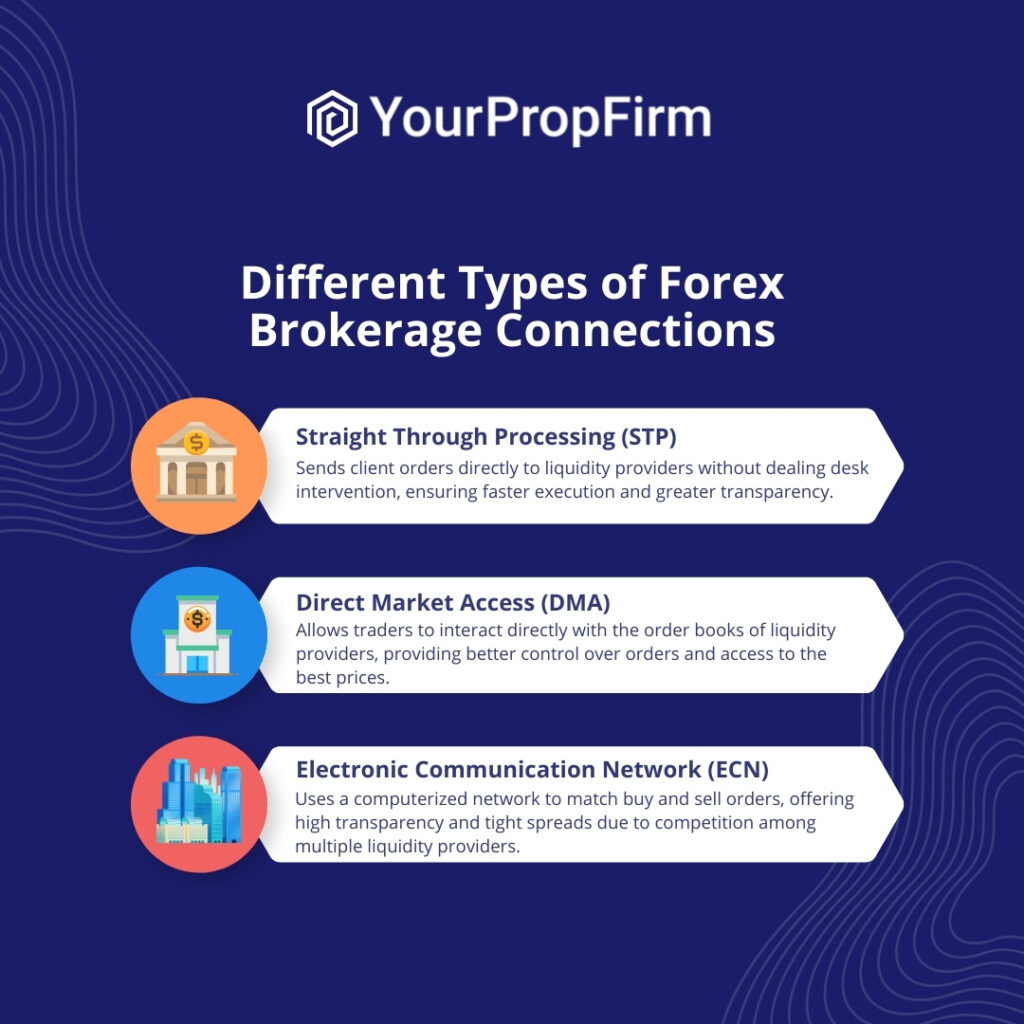Introduction to Forex Broker Connections

Forex brokers use different types of connections to access liquidity providers and execute trades for their clients. These connections determine how trades are processed, the level of transparency, and the overall trading experience. Understanding these connections is crucial for traders when selecting a broker.
Types of Connections
- Straight Through Processing (STP): STP brokers send client orders directly to liquidity providers without any dealing desk intervention. This ensures faster execution and greater transparency, as trades are processed at the best available prices.
- Direct Market Access (DMA): DMA allows traders to interact directly with the order books of liquidity providers. This gives traders greater control over their orders and access to the best possible prices, enhancing the overall trading experience.
- Electronic Communication Network (ECN): ECN brokers use a computerized network to match buy and sell orders within the network. This setup provides high transparency and tight spreads due to the competition among multiple liquidity providers.
Understanding STP, DMA, and ECN is important for traders to make informed decisions when choosing a broker, as each connection type offers distinct advantages and impacts the trading process differently.
What is STP (Straight Through Processing)?
STP, or Straight Through Processing, is a method used by Forex brokers to directly transmit client orders to liquidity providers without any dealing desk intervention. This process ensures that trades are executed seamlessly and efficiently in the Forex market.
STP works by sending client orders straight to the liquidity providers. When a trader places an order, the STP broker routes it directly to one or more liquidity providers, which can include banks, financial institutions, or other brokers. This direct transmission means that the broker does not take the opposite side of the trade, reducing potential conflicts of interest.
Advantages of STP
- Faster Execution Times: Since there is no dealing desk intervention, orders are processed more quickly, allowing traders to take advantage of market opportunities in real-time.
- Lower Risk of Manipulation: Because trades are transmitted directly to the market, there is a reduced risk of price manipulation by the broker.
- Increased Transparency: Traders benefit from greater transparency, as they receive the best available prices from liquidity providers without hidden markups or delays.
Challenges with STP
- Dependency on Liquidity Provider’s Speed and Reliability: The efficiency of STP depends heavily on the speed and reliability of the liquidity providers. If a liquidity provider is slow or unreliable, it can affect the execution quality.
- Variable Spreads: While STP brokers offer competitive spreads, these can vary depending on market conditions and the liquidity provider’s quotes, potentially leading to higher trading costs during volatile periods.
Overall, STP provides a streamlined and transparent trading experience, making it a popular choice among Forex traders. However, its effectiveness is closely tied to the performance of the liquidity providers involved.
Understanding DMA (Direct Market Access)
Direct Market Access (DMA) allows traders to interact directly with the order books of liquidity providers, bypassing intermediaries like brokers or dealing desks. Unlike other brokerage models, DMA provides traders with a direct link to Tier 1 and Tier 2 liquidity providers, enabling them to place orders that affect the market directly.
DMA brokers provide traders with the technology and infrastructure needed to access liquidity providers’ order books. When traders place orders, these are transmitted directly to the liquidity providers, including major banks and financial institutions. This direct connection allows traders to see real-time market data and execute orders at the best available prices without broker intervention.
Advantages of DMA
- Access to Better Prices: Traders can access the best possible prices available in the market, as they are directly connected to multiple liquidity providers.
- Deeper Liquidity: With access to Tier 1 and Tier 2 liquidity providers, traders benefit from deeper liquidity pools, which can lead to better order execution and less slippage.
- More Control Over Trades: DMA gives traders greater control over their trading strategies, including the ability to place limit orders and other advanced order types directly in the market.
Challenges with DMA
- Need for More Sophisticated Trading Technology: Using DMA requires advanced trading platforms and technology, which can be more complex and costly to set up and maintain.
- Higher Capital Requirements: Traders often need higher capital to meet the margin requirements and minimum trade sizes associated with DMA, making it more suitable for institutional or high-net-worth individual traders.
DMA offers significant advantages for traders looking for better prices, deeper liquidity, and greater control over their trades. However, it also demands more sophisticated technology and higher capital, making it more suited for experienced and well-capitalized traders.
Exploring ECN (Electronic Communication Network)
An Electronic Communication Network (ECN) is a type of Forex trading platform that connects traders directly to other market participants in the interbank market. ECNs are significant because they facilitate a transparent and efficient trading environment, allowing for direct interaction between buyers and sellers.
ECN brokers use a computerized network to match buy and sell orders from traders directly with other participants in the interbank market, including banks, financial institutions, and other traders. When a trader places an order, the ECN automatically matches it with the best available order from another participant, ensuring efficient execution without any broker intervention.
Advantages of ECN
- Tighter Spreads: ECN brokers typically offer tighter bid-ask spreads because they aggregate quotes from multiple market participants, leading to more competitive pricing.
- Transparency: ECN trading environments are highly transparent, providing traders with real-time access to the order book and market depth information.
- Anonymity: Trades conducted through ECNs are anonymous, which helps traders execute large orders without revealing their identity or trading intentions, reducing the risk of market manipulation.
Challenges with ECN
- Variable Spreads: While ECNs offer tight spreads, these can vary significantly during periods of high volatility or low liquidity, potentially increasing trading costs.
- Commission Costs: ECN brokers typically charge a commission for each trade, which can add up, especially for high-frequency traders or those dealing in large volumes.
ECNs provide a transparent, competitive, and efficient trading environment, making them an attractive choice for many Forex traders. However, the variable spreads and additional commission costs are factors that traders need to consider when opting for this type of trading platform.
Comparing STP, DMA, and ECN
STP (Straight Through Processing)
- Unique Features: Directly transmits client orders to liquidity providers without broker intervention.
- Suitability: Suitable for traders looking for faster execution and greater transparency.
- Impact on Trading Strategy: Reduces the risk of price manipulation and allows for real-time execution.
DMA (Direct Market Access)
- Unique Features: Provides direct access to the order books of liquidity providers, allowing traders to place orders that affect the market directly.
- Suitability: Ideal for institutional traders and those with higher capital who need greater control over their trades.
- Impact on Trading Strategy: Offers access to better prices and deeper liquidity, enhancing strategic flexibility.
ECN (Electronic Communication Network)
- Unique Features: Connects traders directly to other market participants in the interbank market, ensuring high transparency and tight spreads.
- Suitability: Suitable for traders who prioritize transparency, competitive pricing, and anonymity.
- Impact on Trading Strategy: Allows for tighter spreads and anonymous trading, beneficial for large volume traders.
How to Choose the Right Connection for Your Trading Needs
Choosing the right connection type—STP, DMA, or ECN—depends on various factors that align with your trading style, volume, and available capital. Additionally, different trader profiles may find certain connection types more beneficial based on their specific needs and experience levels.
Factors to Consider
1. Trading Style
Your trading strategy plays a crucial role in choosing the right connection. Scalpers and high-frequency traders might prefer ECN for its tighter spreads and quick execution, while swing traders might benefit from the transparency and lower manipulation risk of STP.
2. Volume
The volume of trades you plan to execute matters. High-volume traders may find ECN more cost-effective despite its commission costs, due to the tight spreads. Lower volume traders might prefer STP for its simplicity and lower overall costs.
3. Capital
Your available capital also influences the choice. DMA requires more sophisticated technology and higher capital, making it more suitable for institutional traders or high-net-worth individuals. STP and ECN can be suitable for both retail and institutional traders, depending on their specific needs and resources.
Trader Profiles
Different types of traders may benefit more from one connection type over another. Here are some profiles to consider:
1. Beginners
STP is often best for beginners due to its straightforward setup and transparent pricing. It allows new traders to execute trades without worrying about complex order routing and technology requirements.
2. Veterans
Experienced traders might prefer DMA for its direct market access and control over trade execution. This setup is ideal for those who want to interact directly with liquidity providers and optimize their trading strategies.
3. Scalpers
Scalpers and high-frequency traders benefit from ECN’s tight spreads and rapid execution. The ability to trade anonymously and access multiple liquidity providers is crucial for these strategies.
4. Algorithmic Traders
Those focused on algorithmic trading may find DMA and ECN the most suitable due to their advanced technology and direct market access.
The Future of Forex Trading Connectivity
Emerging trends and future developments in brokerage technology are set to reshape how traders interact with the market. Understanding these changes can help traders make informed decisions about choosing between STP, DMA, and ECN.
1. Advanced Algorithms and AI
The use of advanced algorithms and artificial intelligence (AI) is on the rise. These technologies can enhance trade execution by predicting market movements and optimizing order routing. AI-driven systems may make STP more efficient by reducing latency and improving order execution accuracy. Similarly, DMA and ECN platforms could leverage AI to provide more precise and faster market access.
2. Blockchain Technology
Blockchain technology offers enhanced transparency and security for financial transactions. Its adoption in Forex trading could lead to more transparent and tamper-proof trading environments. STP, DMA, and ECN could all benefit from blockchain by ensuring that trades are executed with high integrity and reduced risk of fraud.
3. Regulatory Changes
Regulatory changes aimed at increasing market transparency and protecting traders are expected to continue. Stricter regulations might require brokers to provide more detailed reporting and compliance measures. This could make STP more appealing to retail traders seeking transparency and fairness. DMA and ECN platforms might also see increased adoption as they typically offer higher transparency and better alignment with regulatory requirements.
4. Enhanced Trading Platforms
Trading platforms are continually evolving with better user interfaces, more powerful analytics, and integration with other financial services. These enhancements can make all three connection types—STP, DMA, and ECN—more accessible and user-friendly. Improved platforms can help traders execute strategies more effectively and access market data more efficiently.
5. Increased Competition
As more brokers and financial institutions adopt advanced technologies, competition will likely increase. This could lead to tighter spreads, lower commissions, and more innovative services. Traders might benefit from better pricing and more options, making it crucial to understand the unique advantages of STP, DMA, and ECN to choose the best fit for their needs.
Advancements in technology and regulatory changes will continue to shape the landscape of Forex trading connectivity. Staying informed about these developments will help traders adapt and make better choices in their trading strategies.
Frequently Asked Questions (FAQ)
What is the difference between STP and ECN?
STP (Straight Through Processing) brokers send client orders directly to liquidity providers without any dealing desk intervention. This ensures faster execution and greater transparency, as trades are processed at the best available prices from the liquidity providers. ECN (Electronic Communication Network) brokers, on the other hand, connect traders directly to other market participants within the network, including banks and financial institutions. ECN platforms offer tighter spreads and greater transparency, but typically charge a commission on each trade.
Can DMA be more cost-effective than ECN?
DMA (Direct Market Access) can be more cost-effective than ECN for certain traders, particularly those who trade large volumes or require precise control over their trades. While DMA may involve higher initial setup costs and require more sophisticated trading technology, it provides direct access to liquidity providers’ order books, often resulting in better pricing and execution. However, ECN can also be cost-effective due to its tight spreads, despite the commission fees.
What is the best type of connection for high-volume traders?
For high-volume traders, ECN is often the best choice. ECN platforms offer tighter spreads, which can significantly reduce trading costs for large volumes. Additionally, the high transparency and anonymity provided by ECN are beneficial for high-frequency and algorithmic trading strategies. However, DMA is also suitable for high-volume traders who need direct access to market depth and prefer the flexibility and control over order execution that DMA provides.
Conclusion
Understanding the different types of Forex broker connections—STP, DMA, and ECN—is crucial for making informed trading decisions. Each connection type offers unique advantages and challenges, impacting execution speed, transparency, and trading costs.
To optimize your trading strategy, it’s essential to evaluate which connection type aligns best with your trading style, volume, and capital. I encourage you to conduct further research based on your specific needs and preferences, and to explore additional resources and educational materials to deepen your understanding of these critical trading infrastructures.




